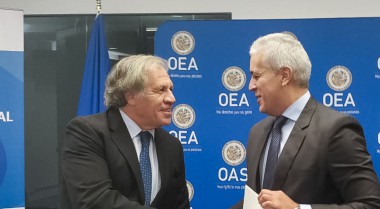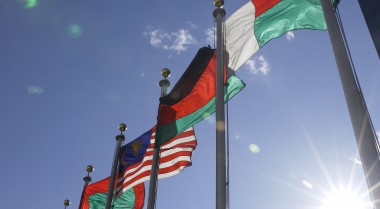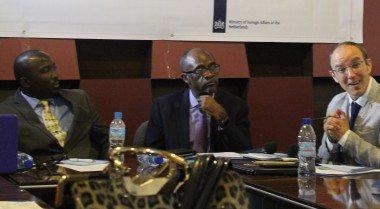
Peacebuilding at UNGA74: Are We Taking Sustaining Peace Seriously?
On 17 September 2019, the 74th Session of the UN General Assembly (UNGA74) opened its doors under the theme “Galvanizing multilateral effort for poverty eradication, quality education, climate action and inclusion”.
GPPAC’s team was there to explore the ways in which conflict prevention and sustaining peace were featured throughout the discussions.
A Decade Of Action on Sustainable Development: Next Steps
For a long time, GPPAC and other peacebuilding actors have said that not enough is being done to accelerate progress with the Sustainable Development Goals (SDGs), particularly SDG16.
The key expectation from the UNGA74 for all peacebuilders was focused on the SDG Summit and the Political Declaration that was expected to strengthen progress on peaceful, just and inclusive societies.
The 2019 International Peace Day statement drafted by civil society included the call for a radically different approach to development, particularly in conflict-affected and transitional environments
In the declaration, world leaders called for a decade of accelerated action to deliver the SDGs by 2030. Specific commitments made in the Declaration included: proactively mainstreaming the 2030 Agenda into our national planning instruments, policies, strategies and financial frameworks; ensuring policy coherence for sustainable development; advancing our shared efforts in communicating the 2030 Agenda to the global public to raise awareness and inspire accelerated action.
However, progressive language on strengthening operational partnerships between the UN and civil society and local peacebuilders nor conflict prevention was featured in the document. There was also a distinct lack of concrete proposals.
It comes in contrast to the proposals and recommendations put forth by peacebuilding community: The 2019 International Peace Day statement drafted by civil society included the call for a radically different approach to development, particularly in conflict-affected and transitional environments. Peacebuilders also entreated Member States to recommit their support for and partnership with local and community actors, and for the UN system to model inclusion in all its local and global processes.
However, the UNG74 fell rather short on delivering on these integral priorities.
Sustaining Peace ahead of the 2020 Review
Positivity can be taken from, civil society, regional organizations and the UN actors efforts to use this vitally important opportunity to look beyond the SDG Summit. They came together to explore avenues for mobilizing and enhancing the capacities of regional organizations to sustain peace and generate ideas for how the 2020 Review of the UN peacebuilding architecture can potentially present an opportunity to strengthen the partnership and dialogue between UN entities and regional organizations.
The Roundtable highlighted the need to operationalize regional structures to support a more holistic approach to peacebuilding and sustaining peace. Such an approach called for: a) stronger commitment to ensuring greater coherence and complementarity on the regional level; b) long-term approaches to peacebuilding; c) Member States’ commitment for the Sustaining Peace Agenda; d) sustainable funding of regional peacebuilding efforts; and e) enabling the 2020 Review of peacebuilding architecture to accelerate progress on the regional level.
Sustaining development and sustaining peace should be recognised as evolutionary developments that build upon decades of progress in the understanding of conflict prevention.
Some of the key proposals included (a) the creation of an annual forum for dialogue and accountability on Sustaining Peace, where relevant actors can stake on the process and adjust the process, and (b) the development of sustainable mechanisms and strategies to advance joint locally-led analysis and effective coordination of such undertaking. Both initiatives were believed to ensure complementarity and coordinated efforts envisioned in the dual 2016 Resolutions on Peacebuilding and Sustaining Peace.
Opportunities for Change
The principles of peacebuilding and sustaining peace were a strong feature of discussion.
The Launch of the Global Alliance of Regional Women Mediator Networks marked another step in ensuring that regional conflict prevention efforts will be strengthened through the recognition of the importance of pursuing inclusive peace processes, understanding the complex gender dimensions of conflict and working with civil society organizations, in the spirit of the dual 2016 resolutions on Sustaining Peace.
At the Climate Change Summit, the UN Secretary General Antonio Guterres stated that “Today peace faces a new danger: the climate emergency, which threatens our security, our livelihoods and our lives”. This is a progressive step towards the recognition of climate and security dimension.
Challenges in advancing these global agendas persist. In part, due to the lack of localized analysis of root causes, with existing “peacebuilding templates” often not matching the root causes of violence in these specific contexts.
In this process, civil society voices came loud and clear to the contrary of traditional discussions. Sharon Bhagwan Rolls brought to the attention of the General Assembly the work that women in the Pacific are doing to promote non-militarized and immediate responses to climate change. This means not learning from women, but looking “at new ways of supporting women” and their important work.
Moving Forward in 2020
Sustaining development and sustaining peace should be recognised as evolutionary developments that build upon decades of progress in the understanding of conflict prevention.
These agendas have already significantly changed the situation in many countries, including Liberia, Papua New Guinea, Ghana and Cameroon; adapting their approach towards operationalizing conflict prevention and sustaining peace.
However, the challenges in advancing these global agendas persist. In part, due to the lack of localized analysis of root causes, with existing “peacebuilding templates” often not matching the root causes of violence in these specific contexts.
Localize the action on sustaining peace and development and ensure that activities are locally owned and led, including at the grassroots level.
Members of GPPAC network have undertaken strong efforts to advance conflict prevention, create collaborative processes and participatory mechanisms to solve problems in a particular local or national contexts and inspire and enable others to replicate successes in peacebuilding to advance human security.
However, the Sustaining Peace agenda dictates that efforts should be “a shared task” that requires complementarity and comprehensiveness across all levels.
Building on the discussions from UNGA74 and looking ahead into 2020, Member States should
-
Localize the action on sustaining peace and development and ensure that activities are locally owned and led, including at the grassroots level;
-
Build strong and inclusive partnerships on the local and regional levels and facilitate enhanced channels of communication to intensify partnership between the UN, regional organizations, and national actors;
-
Foster investment in conflict prevention and establish allocated Funds to continue supporting conflict prevention activities;
-
Enhance accountability of international forums for dialogue (including the HLPF) and strengthen opportunities for local peacebuilders directly inform the process and advancing joint locally-led analysis and coordination.


